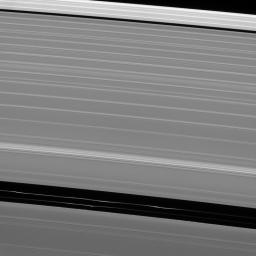
|
Clumpy Ringlets
- Click the image above for a larger view
- Full-Res JPEG (1020 x 1020) (100.6 kB)
- Full-Res TIFF (1020 x 1020) (1.0 MB)
Caption:
Although it appears empty from a distance, the Encke gap in Saturn's A ring has three ringlets threaded through it, two of which are visible here.
Each ringlet has dynamical structure such as the clumps seen in this image. The clumps move about and even appear and disappear, in part due to the gravitational effects of Pan.
This view looks toward the sunlit side of the rings from about 27 degrees above the ringplane. The image was taken in visible light with the Cassini spacecraft narrow-angle camera on May 11, 2013.
The view was obtained at a distance of approximately 199,000 miles (321,000 kilometers) from Saturn and at a Sun-Saturn-spacecraft, or phase, angle of 121 degrees. Image scale is 1 mile (2 kilometers) per pixel.
Background Info:
The Cassini-Huygens mission is a cooperative project of NASA, the European Space Agency and the Italian Space Agency. NASA's Jet Propulsion Laboratory, a division of the California Institute of Technology in Pasadena, manages the mission for NASA's Science Mission Directorate, Washington. The Cassini orbiter and its two onboard cameras were designed, developed and assembled at JPL. The imaging operations center is based at the Space Science Institute in Boulder, Colo.
For more information about the Cassini-Huygens mission visit http://saturn.jpl.nasa.gov and http://www.nasa.gov/cassini . The Cassini imaging team homepage is at http://ciclops.org .
Cataloging Keywords:
| Name | Value | Additional Values |
|---|---|---|
| Target | Saturn Rings | A Ring, Encke Gap, Pan, Saturn |
| System | Saturn | |
| Target Type | Ring | Gap, Planet, Satellite |
| Mission | Cassini-Huygens | |
| Instrument Host | Cassini Orbiter | |
| Host Type | Orbiter | |
| Instrument | Imaging Science Subsystem (ISS) | |
| Detector | Narrow Angle Camera | |
| Extra Keywords | Clump, Grayscale, Visual | |
| Acquisition Date | ||
| Release Date | 2014-08-25 | |
| Date in Caption | 2013-05-11 | |
| Image Credit | NASA/JPL-Caltech/Space Science Institute | |
| Source | photojournal.jpl.nasa.gov/catalog/PIA18277 | |
| Identifier | PIA18277 | |
